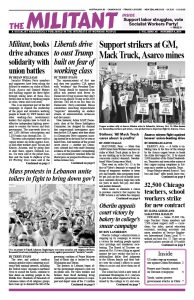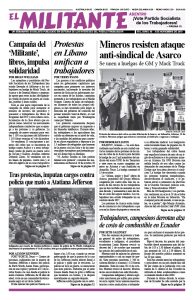The U.S. government announced new measures Oct. 18 that step up its nearly 60-year-long economic war on the Cuban Revolution.
Elliot Abrams, U.S. special envoy for Venezuela, told Reuters Oct. 9, “We’re always looking to ways to squeeze [Cuba] because we do not see any improvement in their conduct either with respect to Venezuela or human rights internally.”
Washington’s goal is to undermine the Cuban Revolution. The U.S. rulers — Democrats and Republicans alike — fear the example of the revolution, which proved that working people can take power out of the hands of the capitalist class and organize society in their own interests.
In April, the Donald Trump administration announced it would allow Title III of the Helms-Burton Act, passed during the Bill Clinton administration, to go into effect. This provision had been suspended ever since it was passed. The administration’s move opened the door to lawsuits by Cuban Americans demanding compensation from those they claim are profiting from property or businesses that were nationalized during the revolution.
Eighteen lawsuits have been filed since, including one by José Ramón López Regueiro, son of the former owner of Havana’s international airport. He sued American Airlines and Chile’s Latam Airlines Group demanding $3 billion.
In June the Donald Trump administration restored some restrictions on travel to Cuba that had been loosened by the Barack Obama administration in 2016. This includes banning “people to people” trips and barring all stops in Cuba by cruise ships, private yachts and fishing vessels, cutting tourism hard cash income.
In September the State Department put Cuban leader Raúl Castro and his four children on a list banning their travel to the United States.
Washington’s new measures in October included barring Cuba from importing anything with more than 10% U.S.-origin content, a change from the previous ceiling of 25%. It also bans leasing planes from U.S. companies.
Washington targets Cuba’s oil supply
A key target for Washington is Cuba’s oil supply, especially from Venezuela. In April sanctions were expanded to include oil-shipping companies and their vessels. In July, Cubametales, the country’s oil import-export company, was sanctioned. Venezuela has tried to continue shipping using its own tankers, but the economic crisis and U.S. economic sabotage there places this in jeopardy.
Cuban President Miguel Díaz-Canel went on television to explain the effects of these attacks, saying September would be rough. To save fuel, air conditioning was cut off in government buildings. Public transit was slashed, cutting passengers from 1.1 million a day in Havana almost in half.
Oxen were pressed into service in agriculture to cut use of tractors. Steel and cement plants reduced production. At times lines of cars snaked around the block as people waited to fill up their gas tanks.
Public workers with government cars organized to pick up passengers at bus stops. Many individual workers did the same, a quality that marks the Cuban Revolution.
More oil shipments arrived in October, easing the fuel shortage. But the U.S. administration has no intention of relenting. On Sept. 10 Trump fired National Security Adviser John Bolton, who he saw as an obstacle to cutting back U.S. involvement in “endless wars” around the world. But two days later he tweeted, “My views on Venezuela, and especially Cuba, were far stronger than those of John Bolton. He was holding me back!”
“Working people should demand the U.S. government end all its assaults on the peoples of Venezuela and Cuba,” James Harris, Socialist Workers Party candidate for delegate to U.S. Congress, said Oct. 19. “In 1959 workers and farmers in Cuba overthrew U.S.-backed dictator Fulgencio Batista, took control of their own destiny and stood tall in support of struggles by workers worldwide. The Cuban Revolution is an example for workers here and elsewhere to emulate!”

